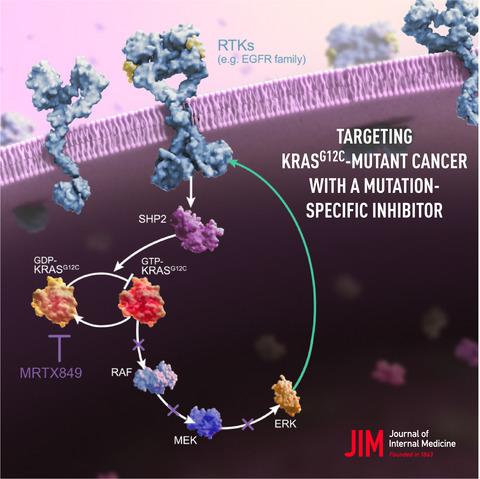当前位置:
X-MOL 学术
›
J. Intern. Med.
›
论文详情
Our official English website, www.x-mol.net, welcomes your
feedback! (Note: you will need to create a separate account there.)
Targeting Krasg12c -mutant cancer with a mutation-specific inhibitor.
Journal of Internal Medicine ( IF 9.0 ) Pub Date : 2020-03-16 , DOI: 10.1111/joim.13057 J G Christensen 1 , P Olson 1 , T Briere 1 , C Wiel 2 , M O Bergo 2
Journal of Internal Medicine ( IF 9.0 ) Pub Date : 2020-03-16 , DOI: 10.1111/joim.13057 J G Christensen 1 , P Olson 1 , T Briere 1 , C Wiel 2 , M O Bergo 2
Affiliation

|
The RAS genes, which include H , N , and KRAS , comprise the most frequently mutated family of oncogenes in cancer. Mutations in KRAS – such as the G12C mutation – are found in most pancreatic, half of colorectal and a third of lung cancer cases and is thus responsible for a substantial proportion of cancer deaths. Consequently, KRAS has been the subject of exhaustive drug‐targeting efforts over the past 3–4 decades. These efforts have included targeting the KRAS protein itself but also its posttranslational modifications, membrane localization, protein–protein interactions and downstream signalling pathways. Most of these strategies have failed and no KRAS‐specific drugs have yet been approved. However, for one specific mutation, KRASG12C, there is light on the horizon. MRTX849 was recently identified as a potent, selective and covalent KRASG12C inhibitor that possesses favourable drug‐like properties. MRTX849 selectively modifies the mutant cysteine residue in GDP‐bound KRASG12C and inhibits GTP‐loading and downstream KRAS‐dependent signalling. The drug inhibits the in vivo growth of multiple KRASG12C‐mutant cell line xenografts, causes tumour regression in patient‐derived xenograft models and shows striking responses in combination with other agents. It has also produced objective responses in patients with mutant‐specific lung and colorectal cancer. In this review, we discuss the history of RAS drug‐targeting efforts, the discovery of MRTX849, and how this drug provides an exciting and long‐awaited opportunity to selectively target mutant KRAS in patients.
中文翻译:

用突变特异性抑制剂靶向Krasg12c突变癌症。
包括H,N和KRAS在内的RAS基因组成了癌症中最常见的致癌基因突变家族。KRAS中的突变在大多数胰腺癌,大肠癌的一半和肺癌的三分之一中都发现了G12C突变,例如G12C突变,从而导致了很大一部分癌症死亡。因此,在过去3-4年中,KRAS一直是详尽的针对药物的目标。这些努力包括针对KRAS蛋白本身,还针对其翻译后修饰,膜定位,蛋白间相互作用和下游信号传导途径。这些策略大多数都失败了,并且尚未批准任何针对KRAS的药物。但是,对于一种特定的突变KRAS G12C来说,曙光已到。MRTX849最近被鉴定为有效,选择性和共价的KRAS G12C具有良好的类药物特性的抑制剂。MRTX849选择性地修饰结合GDP的KRAS G12C中的突变半胱氨酸残基,并抑制GTP负载和下游KRAS依赖性信号传导。该药物抑制多种KRAS G12C突变细胞系异种移植的体内生长,在患者衍生的异种移植模型中引起肿瘤消退,并与其他药物联合使用时显示出惊人的反应。它也对突变型肺癌和大肠癌患者产生了客观反应。在这篇综述中,我们讨论了RAS药物靶向研究的历史,MRTX849的发现,以及该药物如何为选择性靶向突变KRAS的患者提供令人兴奋且期待已久的机会。
更新日期:2020-03-16
中文翻译:

用突变特异性抑制剂靶向Krasg12c突变癌症。
包括H,N和KRAS在内的RAS基因组成了癌症中最常见的致癌基因突变家族。KRAS中的突变在大多数胰腺癌,大肠癌的一半和肺癌的三分之一中都发现了G12C突变,例如G12C突变,从而导致了很大一部分癌症死亡。因此,在过去3-4年中,KRAS一直是详尽的针对药物的目标。这些努力包括针对KRAS蛋白本身,还针对其翻译后修饰,膜定位,蛋白间相互作用和下游信号传导途径。这些策略大多数都失败了,并且尚未批准任何针对KRAS的药物。但是,对于一种特定的突变KRAS G12C来说,曙光已到。MRTX849最近被鉴定为有效,选择性和共价的KRAS G12C具有良好的类药物特性的抑制剂。MRTX849选择性地修饰结合GDP的KRAS G12C中的突变半胱氨酸残基,并抑制GTP负载和下游KRAS依赖性信号传导。该药物抑制多种KRAS G12C突变细胞系异种移植的体内生长,在患者衍生的异种移植模型中引起肿瘤消退,并与其他药物联合使用时显示出惊人的反应。它也对突变型肺癌和大肠癌患者产生了客观反应。在这篇综述中,我们讨论了RAS药物靶向研究的历史,MRTX849的发现,以及该药物如何为选择性靶向突变KRAS的患者提供令人兴奋且期待已久的机会。











































 京公网安备 11010802027423号
京公网安备 11010802027423号